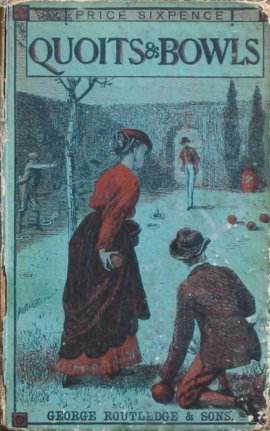| Title | Quoits and Bowls | ||
| Author | Sydney Daryl* | ||
| Publisher | George Routledge and Sons, London, England | ||
| First published | 1868 | ||
| ISBN | Pre-ISBN system | ||
| Edition reviewed | 1st | ||
| Hardback/softback | Hardback | ||
| List price | 6d (2½p) | ||
| Cover size (cm) (height x width) |
16.7 x 10.3 | ||
| Number of pages | 66 (including advertisements) | ||
| Number of pages with | Coloured photos | Black & white photos | Line drawings |
| None | None | None | |
| Synopsis | Published in 1868, this is the second oldest book in my collection. To my knowledge, the only book written exclusively on bowls that predates it is Mitchell's Manual of Bowl Playing published four years earlier.
The first chapter of Quoits and Bowls provides a brief history of both games and includes intriguing insights into the formative years. For example: 'In the very early days of bowling, each player had only one bowl, and the 'jack' was dispensed with or not, according to the taste of the player . . . ' The bowls section proper accounts for 32 of the 64 pages with chapters on 'Hints on the Game', 'The Materials of the Game' and 'Rules of the Game', with the last-named chapter relying heavily on Mitchell's Manual of Bowl Playing. The book's final page contains an interesting passage that reflects something of the social climate that prevailed well over a century ago: 'I should be glad to know that so simple and healthy a pastime [bowls] were as extensively patronized in England as in Scotland, where it has proved a far more seductive agent to draw working-men from the gin-shop and beer-house than all the preaching and tract-distributing ever yet accomplished. Only if bowling is to become a popular amusement with the artizan class, those who desire to promote such an end must take care to have the bowling-green established away from the atmosphere of public houses, which, in a very short time, would make the game only an excuse for drunkenness and dissipation in strong liquors. Bowling is too good a pastime to be thus dragged down into the mud . . . ' *Sidney Daryl was the pen name of Douglas Straight, an English lawyer, Member of Parliament, judge and journalist. He received a knighthood in 1892. |
||



